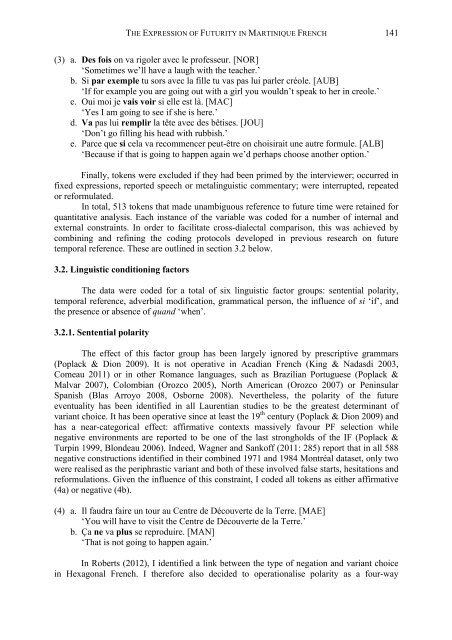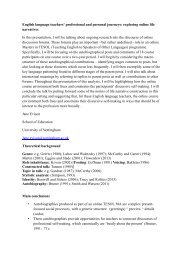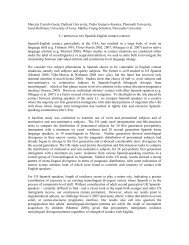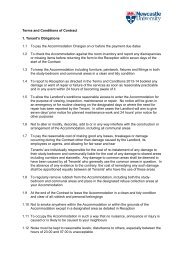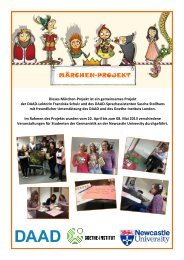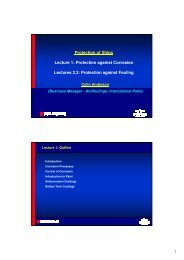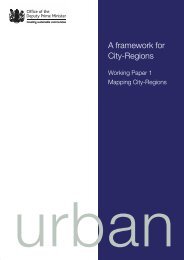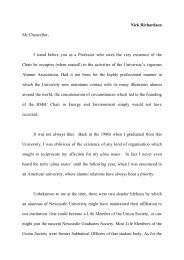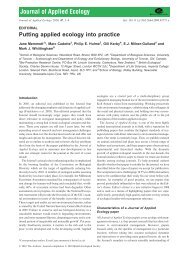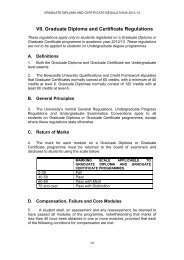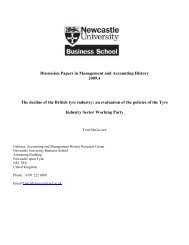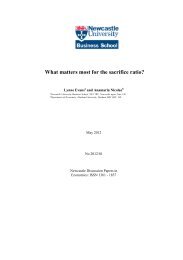the influence of linguistic factors on the expression of futurity
the influence of linguistic factors on the expression of futurity
the influence of linguistic factors on the expression of futurity
You also want an ePaper? Increase the reach of your titles
YUMPU automatically turns print PDFs into web optimized ePapers that Google loves.
THE EXPRESSION OF FUTURITY IN MARTINIQUE FRENCH 141<br />
(3) a. Des fois <strong>on</strong> va rigoler avec le pr<str<strong>on</strong>g>of</str<strong>on</strong>g>esseur. [NOR]<br />
‘Sometimes we’ll have a laugh with <str<strong>on</strong>g>the</str<strong>on</strong>g> teacher.’<br />
b. Si par exemple tu sors avec la fille tu vas pas lui parler créole. [AUB]<br />
‘If for example you are going out with a girl you wouldn’t speak to her in creole.’<br />
c. Oui moi je vais voir si elle est là. [MAC]<br />
‘Yes I am going to see if she is here.’<br />
d. Va pas lui remplir la tête avec des bêtises. [JOU]<br />
‘D<strong>on</strong>’t go filling his head with rubbish.’<br />
e. Parce que si cela va recommencer peut-être <strong>on</strong> choisirait une autre formule. [ALB]<br />
‘Because if that is going to happen again we’d perhaps choose ano<str<strong>on</strong>g>the</str<strong>on</strong>g>r opti<strong>on</strong>.’<br />
Finally, tokens were excluded if <str<strong>on</strong>g>the</str<strong>on</strong>g>y had been primed by <str<strong>on</strong>g>the</str<strong>on</strong>g> interviewer; occurred in<br />
fixed expressi<strong>on</strong>s, reported speech or meta<str<strong>on</strong>g>linguistic</str<strong>on</strong>g> commentary; were interrupted, repeated<br />
or reformulated.<br />
In total, 513 tokens that made unambiguous reference to future time were retained for<br />
quantitative analysis. Each instance <str<strong>on</strong>g>of</str<strong>on</strong>g> <str<strong>on</strong>g>the</str<strong>on</strong>g> variable was coded for a number <str<strong>on</strong>g>of</str<strong>on</strong>g> internal and<br />
external c<strong>on</strong>straints. In order to facilitate cross-dialectal comparis<strong>on</strong>, this was achieved by<br />
combining and refining <str<strong>on</strong>g>the</str<strong>on</strong>g> coding protocols developed in previous research <strong>on</strong> future<br />
temporal reference. These are outlined in secti<strong>on</strong> 3.2 below.<br />
3.2. Linguistic c<strong>on</strong>diti<strong>on</strong>ing <str<strong>on</strong>g>factors</str<strong>on</strong>g><br />
The data were coded for a total <str<strong>on</strong>g>of</str<strong>on</strong>g> six <str<strong>on</strong>g>linguistic</str<strong>on</strong>g> factor groups: sentential polarity,<br />
temporal reference, adverbial modificati<strong>on</strong>, grammatical pers<strong>on</strong>, <str<strong>on</strong>g>the</str<strong>on</strong>g> <str<strong>on</strong>g>influence</str<strong>on</strong>g> <str<strong>on</strong>g>of</str<strong>on</strong>g> si ‘if’, and<br />
<str<strong>on</strong>g>the</str<strong>on</strong>g> presence or absence <str<strong>on</strong>g>of</str<strong>on</strong>g> quand ‘when’.<br />
3.2.1. Sentential polarity<br />
The effect <str<strong>on</strong>g>of</str<strong>on</strong>g> this factor group has been largely ignored by prescriptive grammars<br />
(Poplack & Di<strong>on</strong> 2009). It is not operative in Acadian French (King & Nadasdi 2003,<br />
Comeau 2011) or in o<str<strong>on</strong>g>the</str<strong>on</strong>g>r Romance languages, such as Brazilian Portuguese (Poplack &<br />
Malvar 2007), Colombian (Orozco 2005), North American (Orozco 2007) or Peninsular<br />
Spanish (Blas Arroyo 2008, Osborne 2008). Never<str<strong>on</strong>g>the</str<strong>on</strong>g>less, <str<strong>on</strong>g>the</str<strong>on</strong>g> polarity <str<strong>on</strong>g>of</str<strong>on</strong>g> <str<strong>on</strong>g>the</str<strong>on</strong>g> future<br />
eventuality has been identified in all Laurentian studies to be <str<strong>on</strong>g>the</str<strong>on</strong>g> greatest determinant <str<strong>on</strong>g>of</str<strong>on</strong>g><br />
variant choice. It has been operative since at least <str<strong>on</strong>g>the</str<strong>on</strong>g> 19 th century (Poplack & Di<strong>on</strong> 2009) and<br />
has a near-categorical effect: affirmative c<strong>on</strong>texts massively favour PF selecti<strong>on</strong> while<br />
negative envir<strong>on</strong>ments are reported to be <strong>on</strong>e <str<strong>on</strong>g>of</str<strong>on</strong>g> <str<strong>on</strong>g>the</str<strong>on</strong>g> last str<strong>on</strong>gholds <str<strong>on</strong>g>of</str<strong>on</strong>g> <str<strong>on</strong>g>the</str<strong>on</strong>g> IF (Poplack &<br />
Turpin 1999, Bl<strong>on</strong>deau 2006). Indeed, Wagner and Sank<str<strong>on</strong>g>of</str<strong>on</strong>g>f (2011: 285) report that in all 588<br />
negative c<strong>on</strong>structi<strong>on</strong>s identified in <str<strong>on</strong>g>the</str<strong>on</strong>g>ir combined 1971 and 1984 M<strong>on</strong>tréal dataset, <strong>on</strong>ly two<br />
were realised as <str<strong>on</strong>g>the</str<strong>on</strong>g> periphrastic variant and both <str<strong>on</strong>g>of</str<strong>on</strong>g> <str<strong>on</strong>g>the</str<strong>on</strong>g>se involved false starts, hesitati<strong>on</strong>s and<br />
reformulati<strong>on</strong>s. Given <str<strong>on</strong>g>the</str<strong>on</strong>g> <str<strong>on</strong>g>influence</str<strong>on</strong>g> <str<strong>on</strong>g>of</str<strong>on</strong>g> this c<strong>on</strong>straint, I coded all tokens as ei<str<strong>on</strong>g>the</str<strong>on</strong>g>r affirmative<br />
(4a) or negative (4b).<br />
(4) a. Il faudra faire un tour au Centre de Découverte de la Terre. [MAE]<br />
‘You will have to visit <str<strong>on</strong>g>the</str<strong>on</strong>g> Centre de Découverte de la Terre.’<br />
b. Ça ne va plus se reproduire. [MAN]<br />
‘That is not going to happen again.’<br />
In Roberts (2012), I identified a link between <str<strong>on</strong>g>the</str<strong>on</strong>g> type <str<strong>on</strong>g>of</str<strong>on</strong>g> negati<strong>on</strong> and variant choice<br />
in Hexag<strong>on</strong>al French. I <str<strong>on</strong>g>the</str<strong>on</strong>g>refore also decided to operati<strong>on</strong>alise polarity as a four-way


